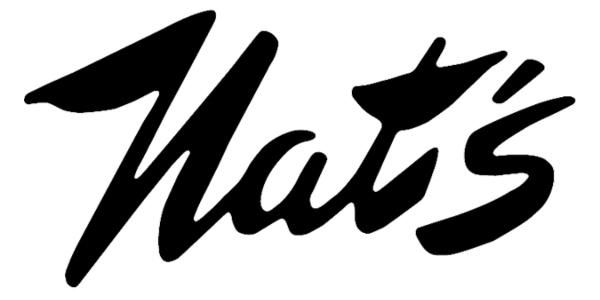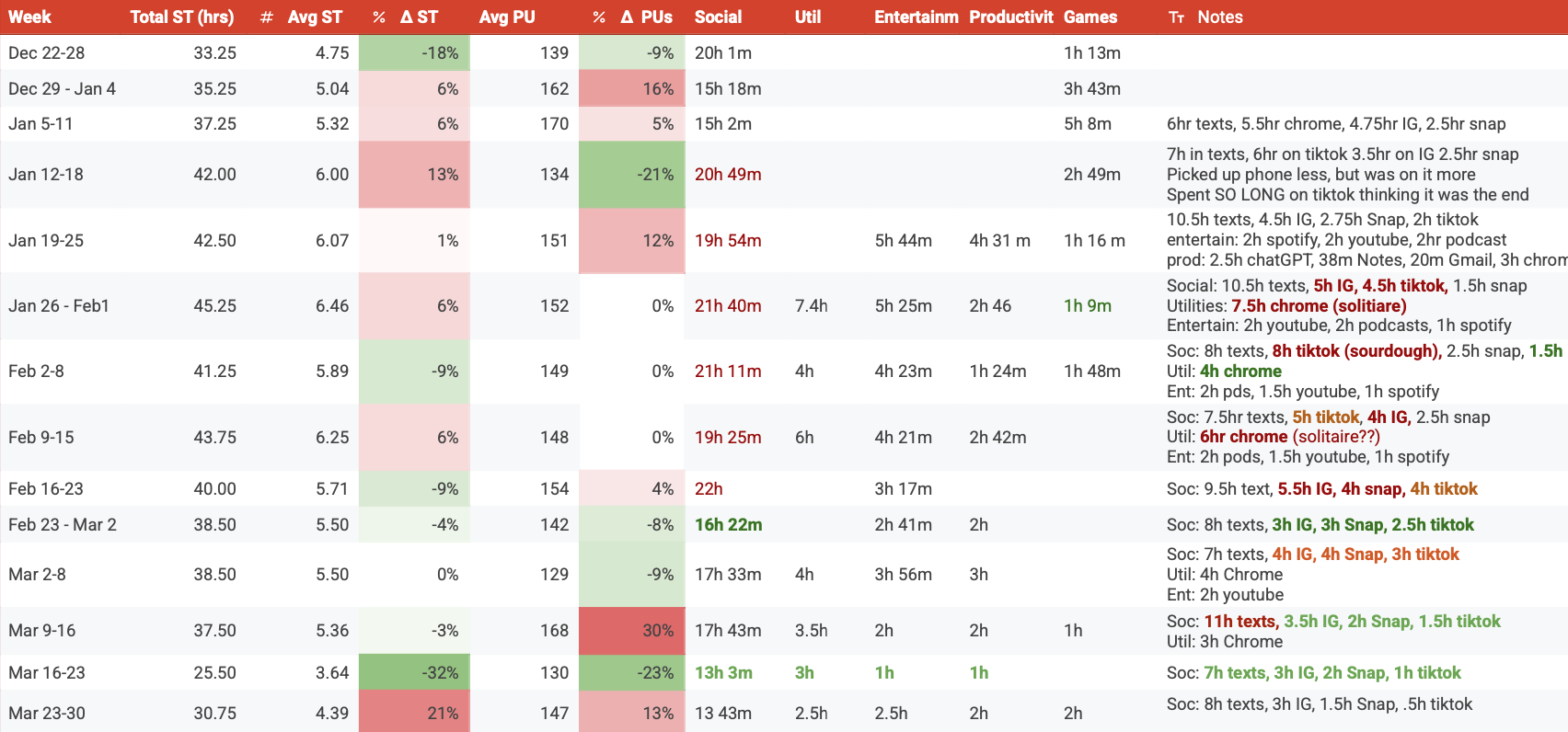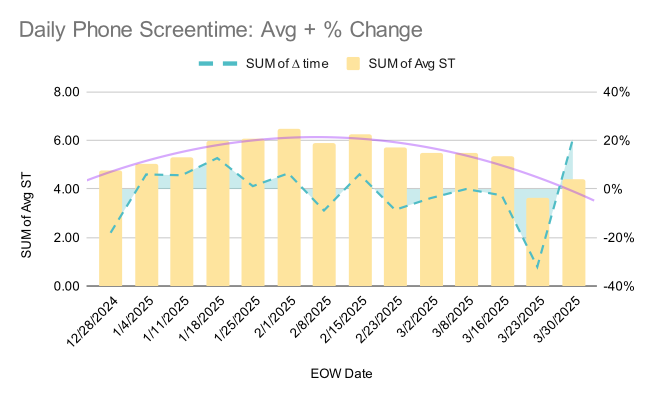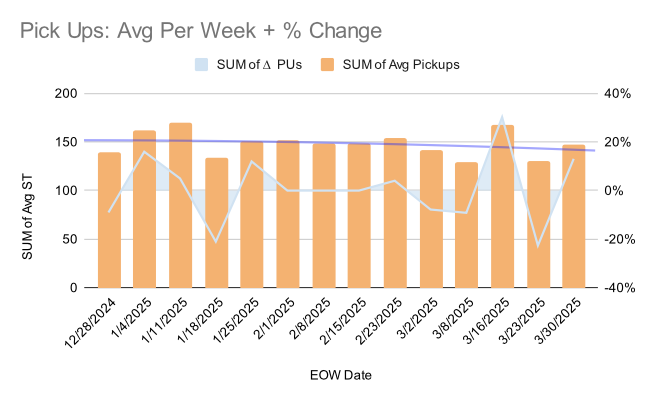I’m a Screenager I fear
At the start of 2025, I found myself reflexively reaching for my phone dozens of times throughout the day. The average American spends over 4 hours daily on their mobile devices, and I suspected I was well above that benchmark. Rather than making vague resolutions to "use my phone less," I decided to take a data-driven approach to understanding and changing my digital habits.
My goal was simple but significant: reduce my overall screen time to create more space for creativity, presence, and real-world connections.
Get that data
To make meaningful change, I needed to understand my baseline habits first. I created a detailed tracking system using the Screen Time feature on my iPhone. This is vulnerable, but here to expose myself for accountability:
Weekly average daily usage
Total weekly hours
Week-over-week percentage changes
Daily phone pickups
Time breakdowns by category (Social, Utilities, Entertainment, Productivity, Games)
App-specific usage within each category
This allowed me to spot patterns I might have otherwise missed. For instance, while I knew I spent time on social media, seeing that it consistently consumed 45-55% of my total screen time was eye-opening.
What the data revealed
When I began tracking in late December 2024, my daily average was 4h 45m. What happened next surprised me—my usage actually increased through January, peaking at a concerning 6h 28m daily average by early February.
The data revealed my primary time consumers:
Text messages: my highest usage app (7-11 hours weekly)
Social platforms: A rotating cast of Instagram, TikTok, and Snapchat
Web browsing: Significant Chrome usage, often for casual games like solitaire
I also discovered that I would often compensate by shifting between platforms—when TikTok usage went down, Instagram would rise, keeping my overall numbers high.
My Turning Point 🤞🏼
By late February, armed with this awareness, I began making intentional changes. I started setting time limits for specific apps, became more mindful of mindless scrolling, and began questioning whether each pickup was necessary.
The results started showing in the data—my average usage began a steady decline. Then came a breakthrough in mid-March: my daily average plummeted to 3h 38m, a 32% reduction from my January peak.
What do I think made the difference? I was visiting family in Auburn, working from my dad's office, and spending quality time with my fam. The contrast was stark: when surrounded by people and purpose, my phone naturally became less central to my day.
This realization was powerful—my highest usage correlated directly with time spent alone in my apartment. My phone had become a substitute for connection rather than a tool for it. Kinda sad, but a good realization to have.
A Decade-Long Relationship with Disconnection
As it turns out, this isn't my first rodeo with digital disconnection. In a blog post from 2015, I documented my experiences going phoneless for several weeks (not by choice—thanks to a series of unfortunate phone losses and thefts).
“The first time I thought my life would not go on without my iPhone by my side. I soon realized the ‘unplugging’ was a nice and much needed break.”
Reading it now feels like opening a time capsule. Ten years ago, I noticed many of the same patterns that still plague us today:
People missing the world around them while staring at screens
The rudeness of interrupting in-person conversations for digital ones
How much faster you move when you're not walking and texting
The surprising amount of extra time you have without constant phone checks
What's crazy is how much more embedded phones have become in our lives since then. In 2015, I wrote about occasionally checking social media and weather apps. In 2025, my data shows I'm spending hours daily across multiple platforms.
The irony wasn't lost on me even back then: "The irony of this entire thing is that I brainstormed this list and recorded my thoughts in the 'Notes' application of my iPhone."
Today, I have made progress
By the end of March 2025, I've stabilized at a daily average of 4h 23m—still higher than I'd like, but a significant improvement from my peak. More importantly, I'm now conscious of the relationship between my environment, emotional state, and digital habits.
My next challenge is clear: creating the same mindfulness when alone that comes naturally when I'm with others. Some strategies I'm implementing:
Designated phone-free zones in my room to prevent scrolling before bed
Scheduled social media checks rather than random scrolling (TBD on this one)
Alternative activities readily available for moments of boredom, like a physical deck of card for solitaire
Time with freinds and community involvement to reduce isolation
Going forward
This journey has taught me that technology itself isn't the problem—it's how mindfully we engage with it. Data helped illuminate pattern I was blind to! Meaningful change happens when we address the underlying needs our devices fulfill.
The phone was filling a need for connection and stimulation. By recognizing this, I can now seek healthier ways to meet those same needs.
As I continue this digital balancing act, I'm reminded that the goal isn't elimination but intention. Each notification, each scroll, each minute spent looking at a screen is a choice—and increasingly, it's a choice I'm making consciously.
Update Friday, April 4: Synchronously, I discovered a podcast with Brian Chesky and Jay Shetty that perfectly aligned with my recent reflections. During their conversation, Airbnb's founder emphasized the importance of seeing him not as a tech founder, but a designer creating experiences and communities in in work at Airbnb. Chesky proceeds with a discussion on loneliness in our technically connected world, directly related to my observations on how screen time substituting for genuine connection.
He dropped line after line that resonated with my journey as a creative and further emphasized that technology should enhance human connection, not replace it. Sometimes the most important innovations come from creative minds asking human-centered questions.
What podcasts have recently inspired your journey?





